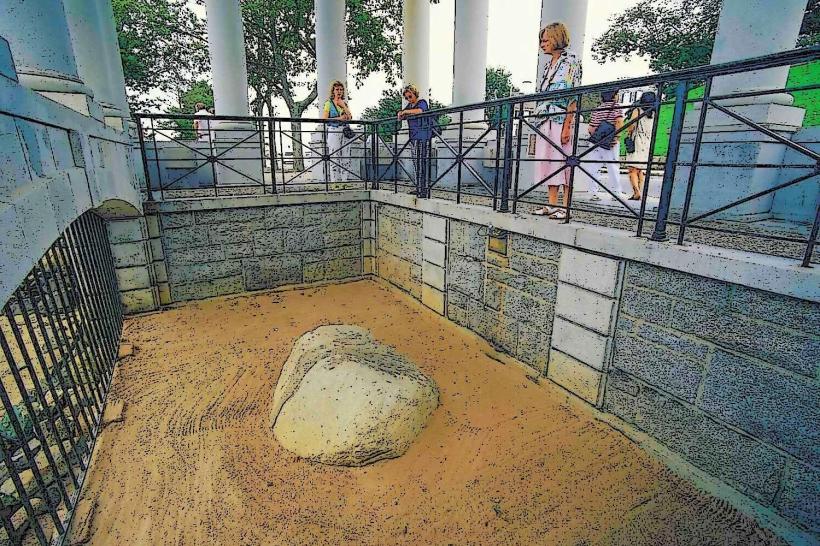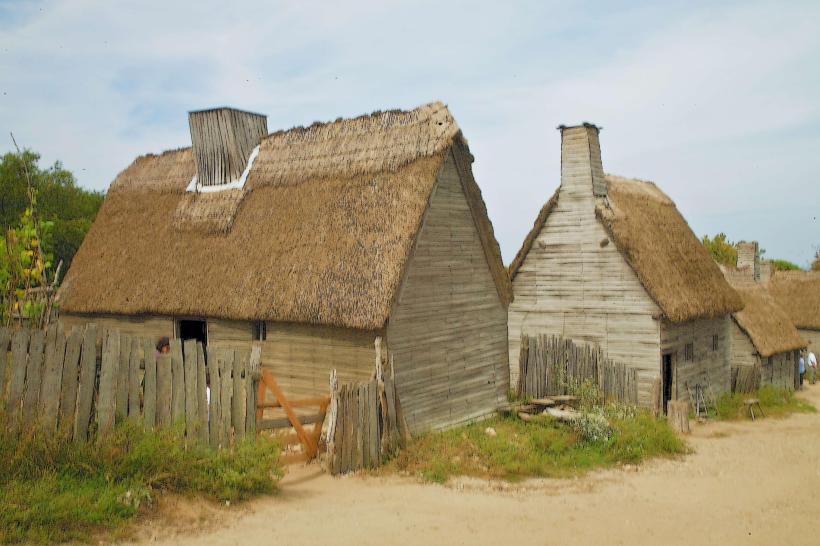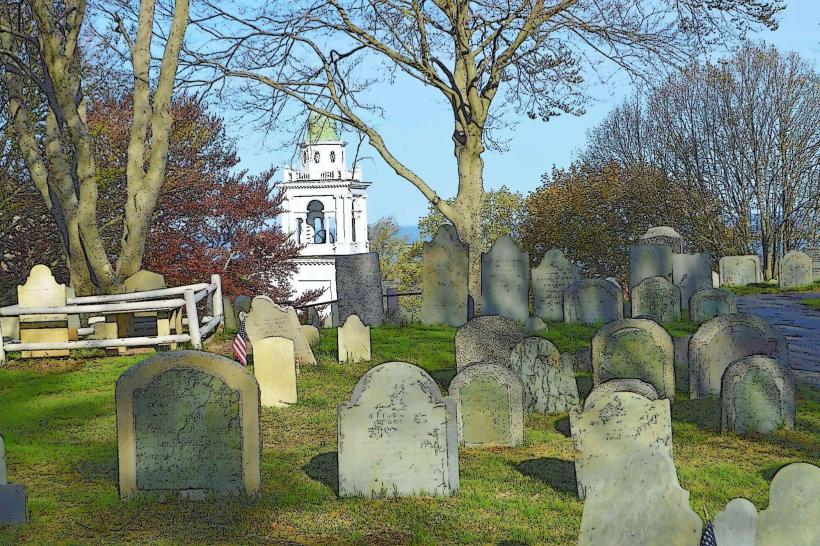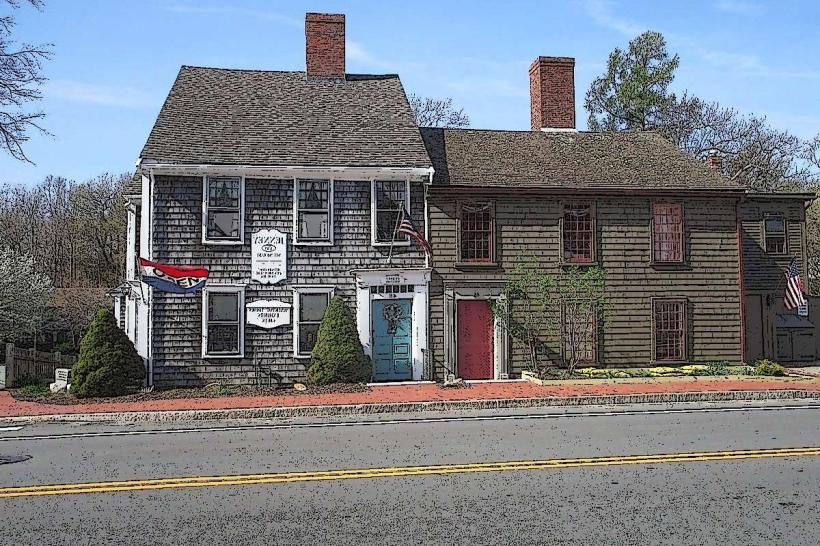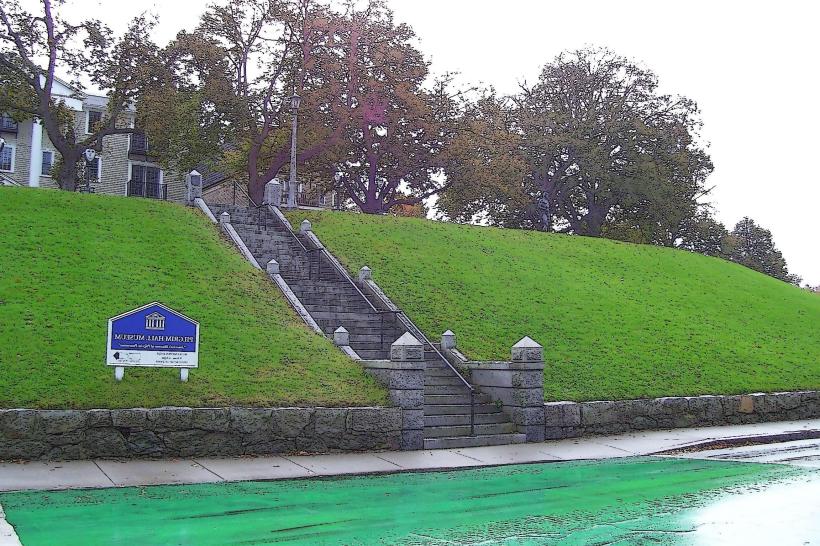Information
Landmark: Pilgrim Hall MuseumCity: Plymouth
Country: USA Massachusetts
Continent: North America
Pilgrim Hall Museum, Plymouth, USA Massachusetts, North America
Overview
At 75 Court Street in Plymouth, Massachusetts, Pilgrim Hall Museum has welcomed visitors since 1824, making it the nation’s oldest public museum still open today, at the same time it’s a leading institution devoted to keeping alive the Pilgrims’ story-their voyage on the creaking Mayflower, the founding of Plymouth Colony, and the vibrant exchanges they shared with the Wampanoag people.Step inside the museum and you’re surrounded by early American colonial history-rare artifacts under glass, exhibits that pull you in, and the creak of vintage wooden floors holding centuries of stories, as well as the Pilgrim Society, founded in 1820 to honor and preserve the Pilgrims’ legacy, established the museum; its early members kept handwritten journals and weathered maps to tell their story.Curiously, They founded it to gather, safeguard, and showcase original artifacts and documents tied to the Mayflower settlers and their descendants, making sure future generations can stand inches from the paper and ink that shaped early America, after that for nearly two hundred years, Pilgrim Hall Museum has steadily grown its collections and sharpened its storytelling, offering visitors an ever-evolving picture of Plymouth Colony’s beginnings and growth-down to the creak of the floorboards underfoot.At Pilgrim Hall Museum, you’ll find one of the world’s most significant collections of Pilgrim-era artifacts, from worn leather shoes to hand-carved wooden chests, on top of that its collection includes personal artifacts of Pilgrims, from worn leather boots to simple wooden bowls once used by leaders of the Plymouth Colony.It appears, Among the treasures are Governor William Bradford’s Bible, worn at the edges and revered as a symbol of the settlers’ faith and leadership; the Brewster Chair, handcrafted by Elder William Brewster, the colony’s spiritual guide; and the sole portrait painted from life of a Pilgrim-Edward Winslow-created in 1651, on top of that at the museum, you can perceive the Sparrow-Hawk-the sole surviving wreck of a 17th‑century transatlantic ship, found off Cape Cod in 1626 with its weathered timbers still bearing the marks of the sea.The Sparrow-Hawk artifacts offer a rare glimpse into early colonial maritime life, from the creak of wooden hulls to the tools that drove trade across rough seas, subsequently Plymouth Rock Fragment: Over the years, the famed stone was shifted and broken apart, and at one point a rough, gray chunk sat on display in the museum.This weathered relic links visitors to the very spot where the Pilgrims first set foot on shore, as a result in the museum’s archives, you’ll find rare 17th-century manuscripts, hand-written letters, weathered diaries, and legal papers that bring to life the settlers’ governance, daily routines, and hard-fought struggles."REAL/MYTHIC: People of Early Plymouth" Exhibit: This key exhibition explores the intertwined histories and evolving narratives of the Pilgrims and the Wampanoag people.The “REAL/MYTHIC: People of Early Plymouth” exhibit dives into the shared history and shifting stories of the Pilgrims and the Wampanoag, tracing them from the salt-swept shores of the settlement’s first days, alternatively it showcases artifacts and stories alongside expert insights that unsettle vintage myths and open a wider view of early colonial encounters-like a worn leather journal that still smells faintly of smoke.The Plymouth Tapestry Project is a bold, community-led artwork that captures Plymouth’s history, threading together many voices and moments like colors in a single cloth, and it’s still growing, panel by panel, inside the museum, in addition the museum’s building stands as both a piece of history and a work of architecture, its stone façade weathered by decades of sun and rain, for the most part To be honest, Alexander Parris, the early 19th-century architect famed for his Greek Revival designs, created the structure from solid Quincy granite, its gray blocks lending a stately, lasting presence, furthermore in the late 1800s, major upgrades transformed the building, and by 1922 a stately innovative portico-crafted by the renowned firm McKim, Mead & White-stood at its entrance, its stone columns cool to the touch.These upgrades didn’t just keep the museum’s beauty intact-they sharpened it, and even made the space easier to navigate, like sunlight spilling across a freshly polished floor, furthermore its spot on the National Register of Historic Places shows just how much it matters-both as a keeper of local stories and as a piece of stone-and-wood craftsmanship worth protecting, perhaps At Pilgrim Hall Museum, visitors can dive into the rich, layered history of Plymouth Colony through a range of engaging programs, with guided tours led by friendly, well-informed docents who bring artifacts, exhibits, and the Pilgrims’ journey to life-right down to the creak of the ship’s wooden deck, as a result school Programs: The museum runs curriculum-based lessons, lets students get their hands on real artifacts, and creates immersive experiences that spark curiosity at every grade level.All year long, the museum brings people together with lively lectures, hands-on workshops, and special events-from unveiling fresh research to marking immense anniversaries, sometimes with the scent of freshly cut cake drifting through the hall, consequently the museum welcomes visitors with disabilities, offering easy access throughout, plus a gift shop stocked with local crafts, clean restrooms, and clear informational guides, somewhat Pilgrim Hall Museum welcomes visitors from early April to early December, Wednesday through Sunday, 9:30 a.m, what’s more to 5 p.m.-though the doors close to innovative guests at 4:30, just as the afternoon light begins to fade.You can buy tickets for adults, seniors, students, and kids, and families, service members, and local residents get a discount-like a few dollars off at the gate, meanwhile kids under six get in free at the museum-no ticket, just a smile at the door, not entirely Pilgrim Hall Museum is a vital keeper of early European settlement history in North America, preserving rare artifacts and bringing their stories to life for visitors, in turn it protects genuine artifacts and tells balanced stories that weave together Pilgrim and Native American voices, helping visitors truly grasp the complexity of this pivotal time.By challenging classical myths and bringing overlooked stories to light-like the tale of a forgotten frontier town-the museum helps shape a fuller, more truthful picture of America’s beginnings, and historians, teachers, students, and everyday readers still rely on it as an essential resource, as steady and dependable as an antique library shelf.Right in the heart of downtown Plymouth, the museum sits a short stroll from Plymouth Rock, the quiet slopes of Cole’s Hill Burial Ground, and the towering National Monument to the Forefathers, anchoring the town’s rich historical tapestry, at the same time at Pilgrim Hall Museum, you’ll step into the world of the Mayflower Pilgrims-feel the weight of their struggles, trace the stories they left behind, and behold how they met and traded with the Wampanoag people., almost
Author: Tourist Landmarks
Date: 2025-10-06

